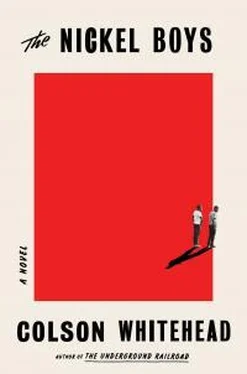Колсон Уайтхед - The Nickel Boys
Здесь есть возможность читать онлайн «Колсон Уайтхед - The Nickel Boys» весь текст электронной книги совершенно бесплатно (целиком полную версию без сокращений). В некоторых случаях можно слушать аудио, скачать через торрент в формате fb2 и присутствует краткое содержание. Год выпуска: 2019, Издательство: Penguin Random House LLC, Жанр: roman, на английском языке. Описание произведения, (предисловие) а так же отзывы посетителей доступны на портале библиотеки ЛибКат.
- Название:The Nickel Boys
- Автор:
- Издательство:Penguin Random House LLC
- Жанр:
- Год:2019
- ISBN:нет данных
- Рейтинг книги:4 / 5. Голосов: 1
-
Избранное:Добавить в избранное
- Отзывы:
-
Ваша оценка:
- 80
- 1
- 2
- 3
- 4
- 5
The Nickel Boys: краткое содержание, описание и аннотация
Предлагаем к чтению аннотацию, описание, краткое содержание или предисловие (зависит от того, что написал сам автор книги «The Nickel Boys»). Если вы не нашли необходимую информацию о книге — напишите в комментариях, мы постараемся отыскать её.
), that the world began to care.
The Nickel Boys — читать онлайн бесплатно полную книгу (весь текст) целиком
Ниже представлен текст книги, разбитый по страницам. Система сохранения места последней прочитанной страницы, позволяет с удобством читать онлайн бесплатно книгу «The Nickel Boys», без необходимости каждый раз заново искать на чём Вы остановились. Поставьте закладку, и сможете в любой момент перейти на страницу, на которой закончили чтение.
Интервал:
Закладка:
EPILOGUE
Those kiosks didn’t like him, no matter how much he jabbed and muttered at the screens. He checked in at the counter. This one’s attendant was a black girl in her mid-twenties, all business. That new breed coming up, like Millie’s nieces, who didn’t take any mess and weren’t afraid to tell you.
“Flying to Tallahassee,” Turner said. “Last name Curtis.”
“Identification?”
He was due for a new driver’s license, now that he shaved his head every other day. He didn’t resemble the picture. The old him. Once he got to Tallahassee he wouldn’t need this license anyhow. It was history.
When the owner of the diner asked him his name, two weeks out of Nickel, he said, “Elwood Curtis.” First thing that popped into his head. It felt right. He used the name from then on when anybody asked, to honor his friend.
To live for him.
Elwood’s death made the papers. He was a local boy, you can’t escape the long arm of the law, that bullshit. Turner’s name in black-and-white newsprint as the other escapee, “a Negro youth.” No description apart from that. Another black boy causing trouble, that’s all you needed to know. Turner hid out in Jaimie’s old stomping grounds—the railroad yards in All Saints. He risked one night at the depot and then hopped a freight north. Working here and there—restaurants, day labor, construction—up the coast. Eventually New York City, where he stayed.
In 1970, he went back to Florida for the first time and requested a copy of Elwood’s birth certificate. The downside of working with sketchy dudes on building sites and in greasy spoons was that they were sketchy, but they also knew shady things, like how to get a birth certificate for a dead man. Dead boy. Date of birth, name of parents, city. Back then it was easy, before Florida wised up and put all those protections in place. He put in for a Social Security card two years later and it arrived in the mailbox, sitting on top of an A&P flyer.
The printer behind the airline counter chattered and whirred. “You have a good flight, sir,” the attendant said. She smiled. “Anything else?”
He woke up. “Thank you.” Lost in that old place. His first visit to Florida in forty-three years. The place reached right through the TV screen and yanked him back.
Millie got home from work last night and he gave her the two articles he printed out on Nickel and the graveyards. “That’s terrible,” she said. “These people get away with everything.” According to one of the pieces, Spencer had died some years before, but Earl was still kicking around. Ninety-five years old, all of them wretched. He was retired, and such “a well-respected member of the Eleanor community” that in 2009 the town bestowed their Good Citizen of the Year Award on him. In the newspaper photo the old supervisor was decrepit, leaning on a cane on his porch, but his cold steel eyes gave Turner a shiver.
“Did you ever hit boys thirty or forty times with a strap?” the reporter asked.
“That is simply not true, sir. I swear on my children’s lives. Just a little discipline,” Earl said.
Millie gave him back the articles. “You know that old cracker beat them boys. A little discipline. ”
She didn’t get it. How could she, living in the free world her whole life. “I used to live there,” Turner said.
His tone. “Elwood?” Like testing the ice to see if it’d bear her weight.
“I was at Nickel. That’s the place. I told you I was in juvie, but I never said the name.”
“Elwood. Come here,” she said. He sat on the couch. He hadn’t served his time, as he told her years ago, but ran. Then he told her the rest, including the story of his friend. “His name was Elwood,” Turner said.
They were on the couch for two hours. Not counting the fifteen minutes, halfway through, that she spent in their bedroom with the door closed: “I have to go, I’m sorry.” She returned, her eyes rubbed red, and they picked it up.
In some ways Turner had been telling Elwood’s story ever since his friend died, through years and years of revisions, of getting it right, as he stopped being the desperate alley cat of his youth and turned into a man he thought Elwood would have been proud of. It was not enough to survive, you have to live—he heard Elwood’s voice as he walked down Broadway in the sunlight or at the end of a long night hunched over the books. Turner walked into Nickel with strategies and hard-won dodges and a knack for keeping out of scrapes. He jumped over the fence on the other side of the pasture and into the woods and then both boys were gone. In Elwood’s name, he tried to find another way. Now here he was. Where had it taken him?
Millie said, “Your falling out with Tom.” Moments from nineteen years resolved into fine grain. It was easier to focus on details. Small things stuck and kept her from taking in the entire picture. His fight with Tom, who worked with him at his first moving job. They’d been friends a long time. It was a Fourth of July barbecue out in Port Jefferson, at the man’s own house. They were talking about some rapper who just got out of jail for tax evasion and Tom said, “Don’t do the crime, if you can’t do the time,” singing it like in the opening credits to that old cop show.
“That’s why they get away with it,” he said to Tom, “because people like you think they deserve it.” Why was he—who? Elwood? Turner? the man she married—defending this deadbeat? Blowing up like that. Yelling at Tom in front of the whole party while he flipped burgers in that silly apron. They drove all the way back to Manhattan in silence. Other small things: Him walking out of movies with no explanation beyond “I’m bored” because a scene—of violence, of helplessness—abducted him and took him back to Nickel. He was always so calm and even then this darkness crept up on him. His rants about cops and the criminal justice system and predators—everyone hated cops, but it was different with him and she taught herself to let him vent when he got on one of his jags because of the feral thing that snuck into his face, the vehemence of his words. The nightmares that tormented him, the ones he claimed not to remember—she knew his reform school had been bad but she didn’t know it had been this place. She took his head into her lap as he wept, running her thumb over that stray-cat notch in his ear. The scar she never noticed but was right in front of her.
Who was he? He was him, the man he had always been. She told him that she understood, as much as she was able to understand that first night. He was him. They were the same age. She had grown up in the same country with the same skin. She lived in New York City in 2014. It was hard to remember sometimes how bad it used to be—bending to a colored fountain when she visited her family in Virginia, the immense exertion white people put into grinding them down—and then it all returned in a rush, set off by tiny things, like standing on a corner trying to hail a cab, a routine humiliation she forgot five minutes later because if she didn’t, she’d go crazy, and set off by the big things, a drive through a blighted neighborhood snuffed out by that same immense exertion, or another boy shot dead by a cop: They treat us like subhumans in our own country. Always have. Maybe always will. His name didn’t matter. The lie was big but she understood it, given how the world had crumpled him up, the more she took in his story. To come out of that place and make something of himself, to become a man capable of loving her the way he did, to become the man she loved—his deception was nothing compared to what he had done with his life.
“I don’t call my husband by his last name.”
“Jack. Jack Turner.” No one had ever called him Jack except his mother and his aunt.
Читать дальшеИнтервал:
Закладка:
Похожие книги на «The Nickel Boys»
Представляем Вашему вниманию похожие книги на «The Nickel Boys» списком для выбора. Мы отобрали схожую по названию и смыслу литературу в надежде предоставить читателям больше вариантов отыскать новые, интересные, ещё непрочитанные произведения.
Обсуждение, отзывы о книге «The Nickel Boys» и просто собственные мнения читателей. Оставьте ваши комментарии, напишите, что Вы думаете о произведении, его смысле или главных героях. Укажите что конкретно понравилось, а что нет, и почему Вы так считаете.

![Колсон Уайтхед - Подземная железная дорога [litres]](/books/411182/kolson-uajthed-podzemnaya-zheleznaya-doroga-litres-thumb.webp)










